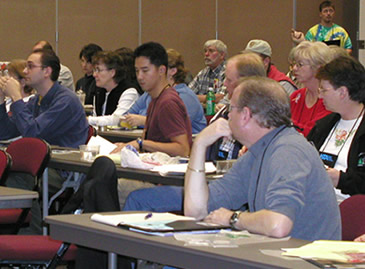 Definitions of Common Educational Terms
Definitions of Common Educational Terms
- Scientific inquiry refers to the diverse ways in which scientists study the natural world and propose explanations based on the evidence derived from their work. Inquiry also refers to the activities of students in which they develop knowledge and understanding of scientific ideas, as well as an understanding of how scientists study the natural world.
- Hands-on learning is learning through doing. The term is used commonly in science education and means that the students investigate a particular scientific phenomenon and develop understanding by actively participating in an activity or experiment.
- Scientific knowledge refers to facts, concepts, principles, laws, theories, and models and can be acquired in many ways.
- Scientific understanding encompasses the ability to use knowledge, and it entails the ability to distinguish between what is and what is not a scientific idea.
- Scientific literacy is the knowledge and understanding of scientific concepts and processes required for personal decision making, participation in civic and cultural affairs, and economic productivity. Scientific literacy means that a person can ask, find, or determine answers to questions derived from curiosity about everyday experiences.
- Content of school science is broadly defined to include specific capacities, understandings, and abilities in science.
- Curriculum is the way content is delivered: It includes the structure, organization, balance, and presentation of the content in the classroom. Curricula often will integrate topics from different subject-matter areas--such as life and physical sciences
- The National Science Education Standards, produced by the National Research Council in 1995, are goals for science achievement in K-12 education. They were the result of four years of work by twenty-two scientific and science education societies and over 18,000 individual contributors. States and districts within the United States have typically developed their own science standards based on the National Standards.
- No Child Left Behind (also known as NCLB) attempts to improve performance of American K-12 schools by increasing the standards of accountability for states, school districts, and schools, as well as providing parents more flexibility in choosing which schools their children will attend. The law has drawn criticisms and lawsuits against the Bush administration by some school district and educational organizations that state that the law is flawed and under funded.
Resources:
- Scientists in Schools Home
- About Scientists in Schools
- Getting to Know a School
- Definitions of Common Educational Terms
- Checklist for a School Visit
- Working with K-12 Students
- Science Topics for Students of Different Ages
- Making a Lesson Plan
- Recommended Resources
Last modified September 30, 2005 by Lisa Gardiner.









